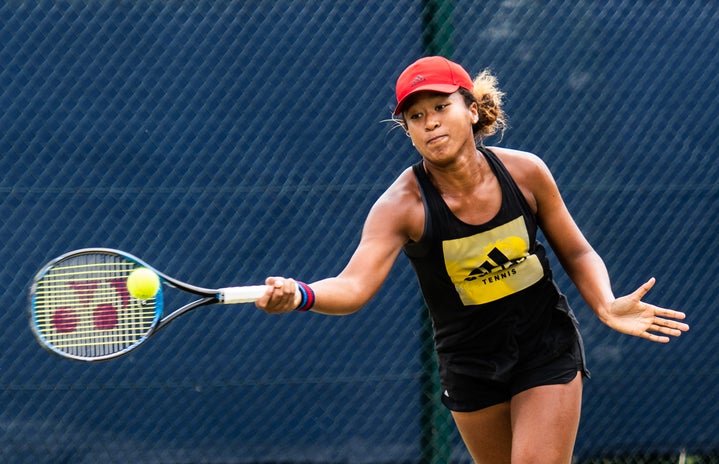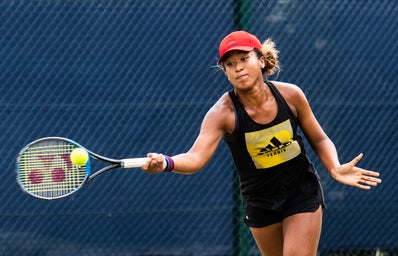On June 8, Naomi Osaka announced that she will not be participating in the Berlin WTA 5000 grass court tournament. This comes after her withdrawal from the French Open on May 31, for which she was fined $15,000 for skipping a mandatory news conference following her first-round win on May 30. Osaka’s withdrawal from the French Open stems from her decision to refrain from taking part in her media obligations, partially due to anxiety that comes with answering questions about her performance on the court.
The four-time Grand Slam singles champion, who has been open about her depression since 2018, took to Twitter to explain her absence. “I’ve often felt that people have no regard for athletes’ mental health and this rings very true whenever I see a press conference or partake in one,” she wrote. “I’ve watched many clips of athletes breaking down after a loss in the press room and I know you have as well.”
Osaka’s decision has been met with criticism from media personalities and other athletes, but more importantly, it has sparked a crucial conversation about why we should normalize talking about mental health in the world of athletics, particularly for college student-athletes.
“Being a college athlete is like having a full-time job while in school.”
Mental health is a key topic of concern for college students and Gen Z. An October 2020 report conducted by the American Psychological Association (APA) showed that Gen Z adults were the most likely generation to say that their mental health has worsened over the past year. Rates of anxiety and depression are at an all-time high, and according to the APA, sports psychologists continue to grapple with helping student-athletes adjust to the effects of the pandemic and navigate an uncertain future.
According to the National Collegiate Athletic Association (NCAA), extreme pressure, combined with the stress of performing well in classes, can contribute to a variety of psychiatric problems for college students. From anxiety to eating disorders, substance abuse disorders, and more, mental health among college athletes differs from the general population — often, the time and energy spent on their chosen sport mean that athletes’ lives and personal well-being can easily become imbalanced.
“Being a college athlete is like having a full-time job while in school,” says Jalisa, a former lacrosse player at Drexel University. “At the time, I was studying civil engineering and was balancing a full class load and lacrosse. We had practice for two to three hours nearly every day — not to mention games at which I would miss class. I was able to sign up early for classes to make sure I was in a class that fit within my schedule, but I was drowning.”
For Sifu, a student on the competitive martial arts team at the University of California at Berkeley, balancing school and athletics presented a similar challenge. “I was on an academic scholarship so I had to keep my grades above a 3.3,” he says. “On top of that, I worked about 20 hours a week to make money and would still have just enough time to make sure I went to team practices and do solo conditioning on the ‘off days.’ It was a ton of pressure that I was only able to manage because of the close friends I made who were there to listen to me rant and would offer to help me in any way I needed.”
“Failure does not feel like an option.”
According to Athletes for Hope (AFH), a non-profit that works to educate and assist athletes in engaging with the community, only 10% of college athletes with mental health issues seek help. Oftentimes, student-athletes may not want to have to lose out on valuable training time or fear losing the respect of their peers and coaches. They also cite perfectionism and fear of failure, both common experiences that hinder many budding athletes from speaking up.
“For many young athletes, doing a sport can become addictive,” says Sifu. “Student-athletes put all of our energy into the sport we’re doing, so when we fail, we feel like we have lost it all, or we feel like we have lost our value. Failure does not feel like an option.”
At schools like Ithaca College, student-athletes can meet with mentors in the school’s graduate psychology program to work on mental training to help combat these issues. In team sessions, topics like effective goal setting, resilience, and stress management during competition are discussed. These skills can be particularly helpful for students who are struggling with stress, performance anxiety, and other general mental health challenges.
“Yes, athletes are built differently, but they are still human.”
The NCAA says that with proper treatment and recognition of early warning signs, most psychiatric disorders in student-athletes can be resolved. However, this means that coaches and even other teammates ought to pay close attention to an athlete’s behavior and report any warning signs — a process that doesn’t always occur. Given the ongoing stigma surrounding mental health, there is also a need for open dialogue among student-athletes, teammates, coaches, and administration to ensure that student-athletes are being cared for, both physically and mentally.
Osaka’s decision to decline press and withdraw from the French Open is a powerful display of self-care. Her unwavering stance to advocate and preserve her mental health should be an example for young athletes everywhere and a reminder that health extends beyond the physical. And while Osaka is not the only high-profile athlete to speak openly about mental health, the harsh criticism she has received from celebrities and even fellow tennis players highlights the need for further dialogue, more education, and greater empathy when it comes to mental health — particularly for young women in the spotlight. Whereas male athletes like Michael Phelps were celebrated for their candor, Osaka was instantly criticized for it.
“Professional athletes are human,” says Jalisa, who believes Osaka’s actions were brave. “There is no need for them to push themselves so that they one day have a mental breakdown. Mental health is just as important as physical health. Being able to wake up every day with a mentality to push yourself through every practice is not something the average person can do. Yes, student-athletes and professional athletes are built differently, but they are still human.”
“I felt more stressed than I have ever been, throughout my college school years.”
Erin, who is a member of the bowling team at Lewis University, feels similarly. “I don’t think anyone should be forced to speak publicly if they don’t feel comfortable,” she tells Her Campus. “So many people out there, more than likely, do not feel comfortable sharing what’s on their mind in the moment. What [Osaka] did was very bold and mature.”
Young athletes today face an enormous amount of pressure to succeed, and Osaka’s recent announcements serve as a reminder to take a step back when needed. “This school year brought a lot of stress to my life,” says Erin. “I felt more stressed than I have ever been, throughout my college school years. I had hard classes, and on top of that, I had to do online classes or miss out on classes because of being quarantined. I did attend counseling to talk to somebody about how I was feeling and what was bothering me.”
For student-athletes struggling with mental health, it may be helpful to work with a well-trained psychologist with a special background in athletics who is well-versed in addressing the unique needs of college-age athletes. Students can also utilize university counseling services, search for a therapist, explore online resources, and learn how to take action and continue the mental health conversation within their community.
“Taking care of your mental health is just as important as your physical health,” says Jalisa. “Always remember to ask for help. Student-athletes are supposed to be resilient and hardworking, but you’re also just a kid. Everyone needs a break. Asking for what you need makes you stronger.”
Studies referenced:
Berman, R. (2020, May 6). How do people cope with the pandemic? Survey reveals worrying trends, https://www.medicalnewstoday.com/articles/how-do-people-cope-with-the-pandemic-survey-reveals-worrying-trends.
Květon, P., Jelínek, M., & Burešová, I. (2021). The role of perfectionism in predicting athlete burnout, training distress, and sports performance: A short-term and long-term longitudinal perspective. Journal of Sports Sciences, 1-11. https://www.tandfonline.com/doi/abs/10.1080/02640414.2021.1911415
O’Hara, D. (2020, July 20). Sports psychologists grapple with worried athletes during COVID-19, https://www.apa.org/members/content/athletes-covid-19.
Stress in America™ 2020: A National Mental Health Crisis. (2020, October), https://www.apa.org/news/press/releases/stress/2020/report-october.
Stull, T. (2017, July 18). Mind, Body and Sport: The psychiatrist perspective, https://www.ncaa.org/sport-science-institute/mind-body-and-sport-psychiatrist-perspective.


